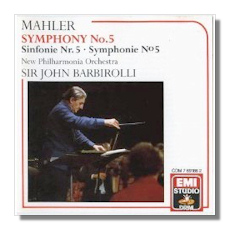
The Internet's Premier Classical Music Source
Related Links
- Mahler Reviews
- Latest Reviews
- More Reviews
-
By Composer
-
Collections
DVD & Blu-ray
Books
Concert Reviews
Articles/Interviews
Software
Audio
Search Amazon
Recommended Links
Site News
 CD Review
CD Review
Gustav Mahler

Symphony #5
New Philharmonia Orchestra/John Barbirolli
EMI CDM769186-2
Also available on EMI Great Recordings Of The Century 66962-2:
Amazon
- UK
- Germany
- Canada
- France
- Japan
- ArkivMusic
Or Warner/EMI 433290-2
Amazon
- UK
- Germany
- Canada
- France
- Japan
- ArkivMusic
- CD Universe
- JPC
This classic performance can also be found on the "Great Recordings of the Century" line and in box sets, but I am generally not an audiophile and was happy to acquire this particular disc for about four dollars. If I am generally not an audiophile, I am even less likely to turn down such a fine disc at that price. Since the "Great Recordings" series is harder and harder to find as Warner rebrands the EMI catalog, I suggest that collectors not worry about editions, and focus on the music.
Although his much beloved Hallé Orchestra was the his main base of operations during his mid-to-late career, very few of the conductors' recordings with that orchestra are seem as prime recommendations here in the states. Furthermore, Barbirolli's Mahler faces a similar critical dichotomy; admired in Brittan, but subject to some very harsh words stateside. However, few will argue that this is not a great performance. Unlike the Hallé, the New Philharmonia was a world-class ensemble of real stature. Formed after Walter Legge's temper tantrum and subsequent disbandment of the Philharmonia Orchestra, the New Philharmonia was to the Philharmonia Orchestra what the Symphony of the Air was to the NBC Symphony Orchestra. In theory, they were the same ensemble, but differences in management and artistic vision made them very different. I confess that in my review of Riccardo Muti's great Tchaikovsky cycle on Warner that I originally failed to make this distinction, and only the intelligence of our editor saved readers from some real confusion.
This performance has the hallmarks of John Barbirolli's finest readings; a great love for the music with the technical means to realize his intentions. He could be very sloppy, and his love for the music at hand would occasionally turn into mush. But when allied with a great ensemble – mostly, his Berlin Philharmonic recordings get mixed reviews, too – he could be one of the very best. He seems to have had an especially good relationship with the New Philharmonia, with whom he recorded other benchmark discs. Typically excellent in the woodwinds, the New Philharmonia also featured the best low strings in the U. K.. This works very favorably for Mahler, and the brass are also tidier than they tended to be for Klemperer; by this time, the great conductor was old and often sick. For his part, Barbirolli brings depth and insight to the score, and he also manages to keep things tidier than usual. The Adagietto is lovely, but the whole work has great feeling and very good sound. There's tons of Mahler out there, but this is still a classic.
Copyright © 2015, Brian Wigman


















